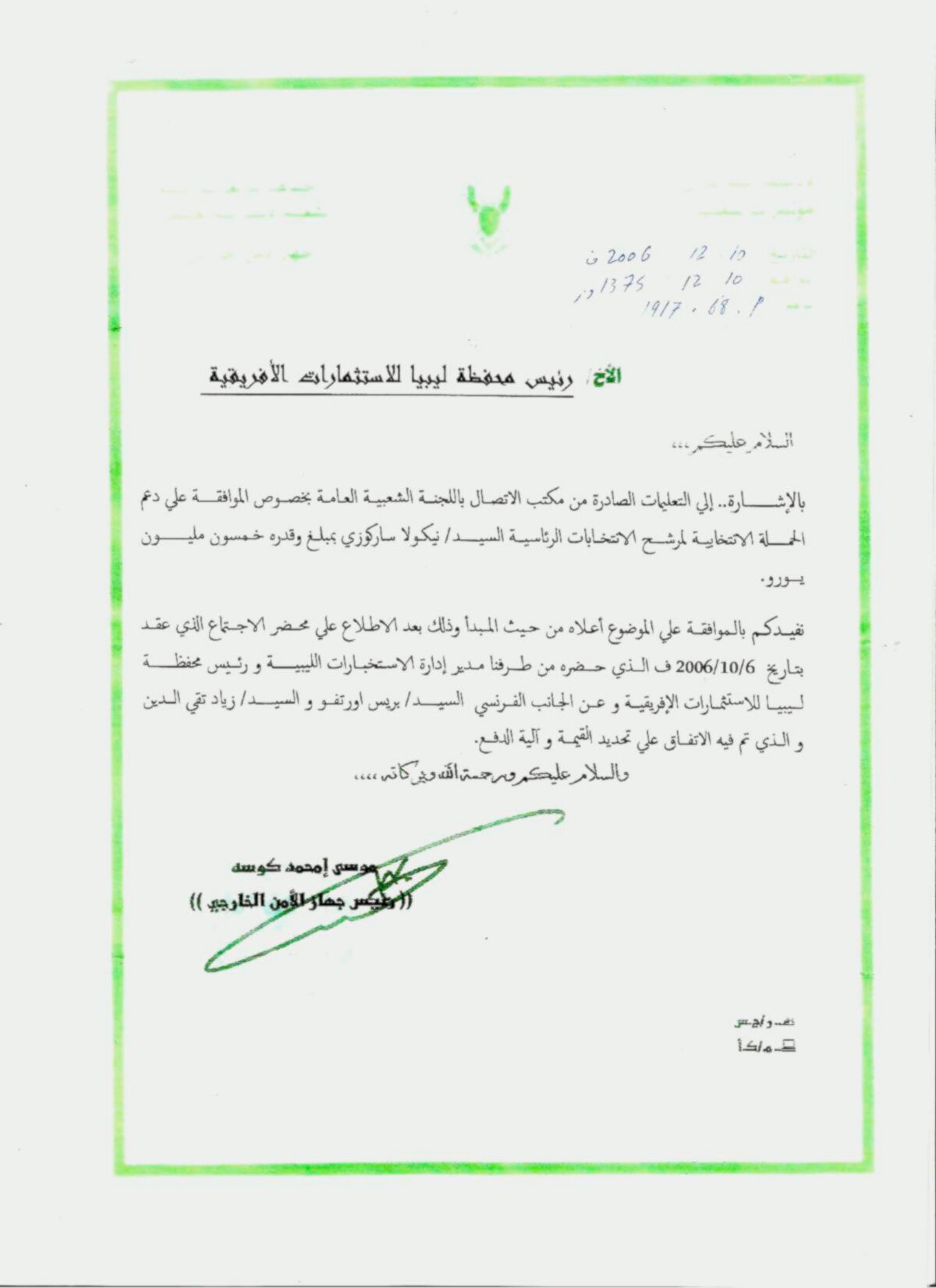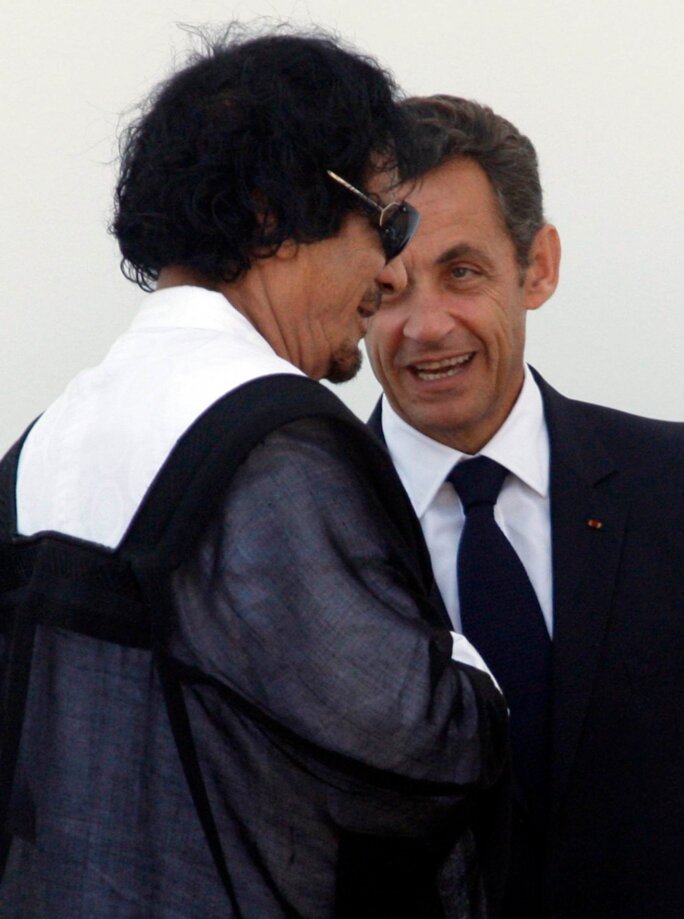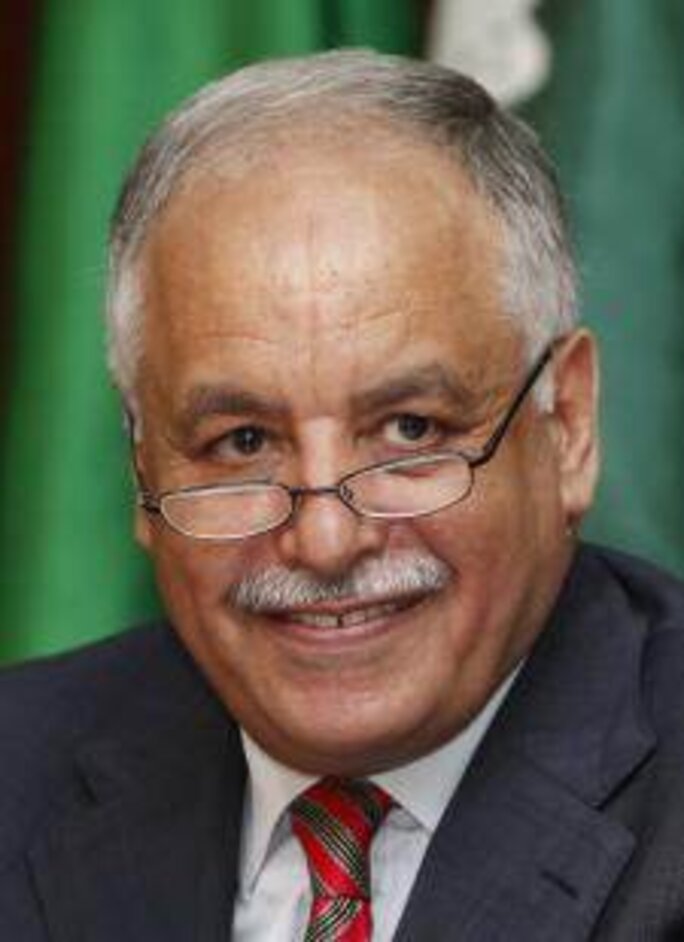An independent judicial investigation has been opened into the suspected illegal funding of Nicolas Sarkozy’s 2007 presidential election campaign by the former Libyan regime of Colonel Muammar Gaddafi, the Paris public prosecutor’s office confirmed Friday.
The investigation into “money laundering, aiding and abetting money laundering and handling of the proceeds”, “influence peddling”, “active and passive corruption”, “fraud and use of the proceeds of fraud” and “misappropriation of company assets” by “unidentified persons” follows evidence uncovered during a preliminary investigation by the public prosecutor’s office.
The preliminary investigation was prompted by the publication by Mediapart on April 28th 2012 of an article which revealed the existence of an official document written by a senior figure in Libya in 2006 referring to the Tripoli regime’s approval of the payment of 50 million euros to help finance Sarkozy's campaign (see a list of links to Mediapart's investigations at the bottom of page 2).
The document, (see full translation of the text in 'boite noire', at the bottom of this page), which survived the bombing of Libya during the bloody overthrow of Colonel Gaddafi in 2011, was obtained by Mediapart in April 2012 from former high-ranking officials of the Gaddafi regime. It is signed by the then head of Libya's foreign intelligence agency, Moussa Koussa.

Enlargement : Illustration 1

Dated December 10th 2006, the letter says that the regime had agreed to “support the electoral campaign” of Nicolas Sarkozy for his 2007 bid, and for the “sum of fifty million euros”.
The letter also states that an agreement on “the amount and method of payment” had been reached at a meeting two months earlier involving Brice Hortefeux, a close friend and political ally of Nicolas Sarkozy who was then minister for local government. The meeting was said to be held in the presence of Franco-Lebanese arms dealer and businessman Ziad Takieddine, who in 2005 had introduced Sarkozy, then interior minister, and a key Sarkozy ally, Claude Guéant, to Libyan regime insiders.
Gaddafi's chief-of-staff, Bashir Saleh, then president of the Libyan African Portfolio (LAP), one of the main investment arms of the regime, was in charge of supervising the payments. After the fall of the Gaddafi regime, Saleh set up in exile in France.
Sarkozy, 58, was last month placed under investigation – one step short of charges being brought – in a separate judicial probe involving the alleged illegal funding of his 2007 election campaign, part of a wide-ranging investigation into corruption surrounding the affairs of L’Oréal heiress Liliane Bettencourt. The three magistrates leading that case found evidence that Sarkozy had exploited the mental frailty of Bettencourt, 90, to obtain cash payments, which he denies.
The decision on Friday to proceed with a judicial investigation into the suspected financing of his campaign by Gaddafi, which Mediapart understands will be led by judges Serge Tournaire and René Grouman, comes after a series of police raids between January 16th and April 11th on the homes and offices of Saleh, Guéant and Takieddine. The raids were carried out by the French police’s national financial and fiscal investigation squad (the Division nationale des investigations financières et fiscales) the Dniff.
These followed a statement confirming Gaddafi’s funding of Sarkozy given on December 19th last by Takieddine to Judge Renaud Van Ruymbeke, the magistrate leading a third major investigation into corruption in which Sarkozy’s name is cited, and which centres on the alleged illegal financing, via French arms sales abroad, of the 1995 presidential election campaign of former prime minister Edouard Balladour, Sarkozy’s political mentor for whom he was campaign spokesman. Takieddine, who was a key figure in the weapons sales at the core of the investigation into Balladour’s campaign, was used during the 2000s as an intermediary for a slew of business deals with Arab countries, including Libya, set up by Sarkozy’s political aides.
In December he was questioned by Van Ruymbeke over his arrest by customs officials, on March 5th 2011, after landing at Le Bourget airport near Paris in a private jet from Libya carrying 1.5 million euros in cash.
During the questioning, Takieddine told Judge Renaud Van Ruymbeke: “I can provide you with elements that exist on the financing beyond 50 million euros of the 2007 campaign of Nicolas Sarkozy.” He also told the judge that “the important period was during December 2006 and January 2007”, adding that Guéant, at the time chief-of-staff to interior minister Sarkozy, gave Bashir Saleh, Gaddafi’s then chief-of-staff, “the banking details necessary for the payments”.
Van Ruymbeke passed the statement on to the preliminary enquiry opened by the public prosecutor’s office into the Gaddafi funding allegations.
Takieddine was a key intermediary in the dealings between Sarkozy’s close entourage and the Libyan regime which began in the mid-200s, as Mediapart has previously revealed with the publication of numerous confidential documents. One of these, dated September 6th 2005, is a "confidential" note to Takieddine sent to Claude Guéant concerning the planning for a visit to Libya by Sarkozy, then interior minister, and which was headed "Visit of the Minister, October 6th 2005". Guéant was to travel to Tripoli to prepare the visit and the sensitive nature of the project was clear: "The preparatory visit is unusual. It must be of a secret nature", wrote Takieddine.
"For this reason it will be preferable that CG [Claude Guéant] travels alone, and that the journey is done ‘without fanfare'", Takieddine continued. "The other advantage: greater ease with which to broach the other important subject, in the most straightforward manner." The "other important subject" was not explained in the document.
When the Gaddafi clan demanded their cash back
On April 27th 2012, the day before Mediapart published the Libyan document, Takieddine told this website that he was not present at the meeting indicated in the letter. “But it could certainly have taken place,” he said. “Your document reflects an agreement signed by Moussa Koussa to support Nicolas Sarkozy's presidential campaign in 2007, and Brice Hortefeux was in fact there at that date, as at other times, that is certain. Monsieur Moussa Koussa and the other people named were indeed the intermediaries with France.”

Enlargement : Illustration 2

Takieddine added: “This document proves that we are witnessing an affair of state, whether those 50 million euros were paid or not. The enquiry will be difficult because many of those involved were killed in the war in Libya, but already it is an important thing to make this document public.”
According to people familiar with the former Libyan regime, consulted by Mediapart before the publication of the document, the letter is written in the normal style of its bureaucracy: the second date under the Western one is not based on the usual Muslim calendar but is instead one imposed by the dictator, and is based on the date of the death of the Prophet Mohammed in 632.
In 2011, both Muammar Gaddafi and his son, Saïf al-Islam, plus the former head of the country's secret services Abdallah Senoussi, referred to the payments. Just two days before the NATO military intervention in Libya in March 2011, Saïf al-Islam made specific accusations in an interview with television channel Euronews.
Asked his opinion of President Sarkozy he answered: “Sarkozy must first give back the money he took from Libya to finance his electoral campaign. We funded it and we have all the details and are ready to reveal everything. The first thing we want this clown to do is to give the money back to the Libyan people. He was given assistance so that he could help them. But he’s disappointed us. Give us back our money. We have all the bank details and documents for the transfer operations and we will make everything public soon.”
The Libyan letter also backs claims made by Jean-Charles Brisard, a French expert on terrorism and terrorist financing, who last year told Mediapart that Brice Hortefeux, a longstanding close friend and political aide to Sarkozy, was the “front” in a financial network set up for the secret funding of Sarkozy’s 2007 election campaign by the Gaddafi regime. The Swiss-based consultant said he had a file containing “precise amounts, names, countries and dates.”
Brisard had prepared a report, entitled ‘GEN/ NS V. MEMO DG’, from a series of notes summarizing confidential conversations he held in December 2006 with a French neurosurgeon, Didier Grosskopf, once a close acquaintance of Ziad Takieddine.
Mediapart gained access to the document written by Brisard, which detailed allegations of how the Tripoli regime funnelled 50 million euros towards Sarkozy’s campaign. Later Brisard claimed he was the victim of a “crude manipulation” by Mediapart, but did not deny being the author of the document.
“Doctor Grosskopf followed Monsieur Takieddine everywhere during his trips,” Brisard told Mediapart, before his sudden decision to publicly distance himself from the illegal funding allegations. “He became the family doctor to all these Arab leaders, in Libya, Syria, the Arab Emirates. Whenever there was one who had a health complaint somewhere, he was sent. He treated everyone, Saif al-Islam...he knew the son and grandson of [late Saudi Crown Prince] Sultan, [and current Saudi Crown Prince, former interior minister] Nayef. I have a list. He accompanied him [Takieddine]. He was in his baggage. He heard lots of things.”
The first part of Brisard’s document of notes recording his conversation with Grosskopf is entitled 'CAMP07', referring to the 2007 French presidential election campaign. In a reference to Nicolas Sarkozy and Brice Hortefeux by their initials, and with abbreviations of words, it describes how the “campaign financing methods” of “NS” were “settled during the NS + BH Libya visit” the two men made on October 6th 2005. Sarkozy was then interior minister preparing to launch his long-planned presidential bid.
According to the notes in ‘CAMP07’, the Libyans were to offer “financing” of a total of 50 million euros through a covert system that involved a “BH” company based in Panama and an unidentified Swiss bank.
However, Brice Hortefeux has strongly denied the claims he was involved in illegal financing of Sarkozy’s campaign. “I have never met Moussa Koussa or Bashir Saleh,” Hortefeux told Mediapart in April 2012. “I have already met Abdullah Senussi, who knew a lot of people, but we have never had a discussion about electoral funding. I have only been to Libya once in my life, in 2005. I therefore make a categorical and verifiable denial.”

Former Libyan Prime Minister al-Baghdadi al-Mahmoudi has also alleged that the Libyan regime financed Sarkozy’s election campaign. Mahmoudi served as Secretary of the Libyan General Peoples’ Committee, a post equivalent to prime minister, from March 2006 until he fled Libya for Tunisia in August 2011 when Gaddafi's forces lost control of Tripoli.
He was initially arrested and jailed by the Tunisian authorities for illegal entry into the country, and was interviewed by Mediapart in May 2012 via questions submitted to him by his lawyer while held in a jail near Tunis pending his eventual extradition back to Libya.
Al-Baghdadi al-Mahmoudi’s lawyer, Beshir Essid, spent several hours with his client on May 2nd 2012 and relayed to Mediapart the answers to precise questions about the funding of Sarkozy’s 2007 election bid. Essid told Mediapart: "He [Mahmoudi] talked to me about the financing, the document and the amount, and the financing was indeed made by Gaddafi to Sarkozy."
“We took part in Mr Sarkozy’s success and in the financing of his 2007 presidential campaign,” Esside quoted Mahmoudi as saying. “I confirm that a document signed by Moussa Koussa exists, and that Monsieur Sarkozy did receive financing,” Mahmoudi told his lawyer.
"This financing by Mr. Gaddafi and Libya is certified by an official document signed by Moussa Koussa via the African financing fund," Mahmoudi told Essid. "The figure of 50 million euros is correct.”
Essid said Mahmoudi expressed surprise at Sarkozy’s commitment to the war against the Gaddafi regime. "He does not understand Mr. Sarkozy’s bitterness and his determination to be one of the main people leading the attack on the country that financed, supported and helped him for his campaign to the tune of 50 million euros," Essid said.
Speaking on French television in March 2012 (see video above), following the initial allegations that his 2007 campaign was financed by Gaddafi, Nicolas Sarkozy, the president, decribed the accusations as “grotesque”. He added: “If he [Gaddafi] had financed it [would seem] I have not been very grateful,” he added, referring to the French military involvement in the NATO-led intervention against Gaddafi’s regime.
-------------------------
For more about the issues raised in this article click on the links to Mediapart's investigations below:
Gaddafi funding of Sarkozy election campaign: the proof
Exclusive: secret report describes Gaddafi funding of Sarkozy's 2007 election campaign
Exclusive: how Sarkozy's team sought grace for Gaddafi's murderous henchman
Exlusive: how President Sarkozy's team dealt with Gaddafi
French IT group Bull horned by libyan internet espionage deal
The French-built stealth offroader that may be hiding Gaddafi
The Sarkozy aide and his secretly-funded Colombian mansion
French political funding scandal reveals a tale of two 'Titty's
Exclusive: British witness in French funding scandal hits back at ‘protected’ arms dealer
British divorcee becomes key witness in French political funding scandal
Net closes in on French presidency after funding 'scam' arrests
Arms dealer probe brings illegal funding scandal closer to Sarkozy
Judges step up hunt for the phantom figure behind the Karachi Affair
The arms dealer and his 'friendly' services for UMP leader Copé
French judge finds key evidence in illegal funding probe
The British thriller writer caught in the plot of the Karachi affair
The secret financier who brings danger to the Sarkozy clan
Sarkozy, the arms dealer, and a secret 350 million-euro commission
The well-connected arms dealer and his tax returns
How Sarkozy aides saved arms dealer from paradise island 'death blow'
The arms dealer and his Paris party for the glitterati
When Total paid the bill for the Elysée's secret emissary
How French intelligence shields the Sarkozy clan's unofficial emissary
Divorce court freezes arms broker's assets
A Q&A guide to the Karachi affair
How the Karachi affair caught up with Nicolas Sarkozy
Senior French defence chief told of former PM's 'kickback scam'
-------------------------
English version by Graham Tearse


